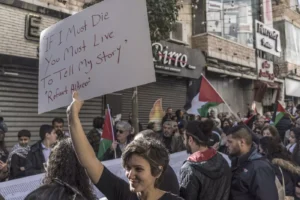‘If I must die… let it be a tale’: How Palestinian writing fights erasure

A Palestinian woman lifts a placard bearing verses by Palestinian poet Refaat Alareer, killed in Gaza on 7 December 2023, in Ramallah, 11 December 2023
Brigitte Herremans writes in Middle East Eye on 8 July 2024:
Art has always played an essential role in Palestinian resistance to Israel’s attempts at symbolic and factual erasure. Palestinians protest, testify and document creatively through stories, music and videos circulating on social media, among other things.
However, Palestinians cannot tell their stories unhindered. Palestinian perspectives are marginalised, questioned, or supplanted by Israeli ones.
European guilt for the Shoah and the persistence of the Zionist myth of the return to the promised land have strongly hindered different perspectives on Israel’s establishment in the Global North. Israel’s dominant narrative has overruled the reality of Palestinian victims of the Nakba, i.e. the transformation of historic Palestine into the state of Israel, established on 78 percent of its territory.
“We were the people dislodged from the land. We were the indigenous inhabitants who were thrown out to make way for a Jewish state,” wrote Edward Said in Power, Politics and Culture. “We are, in fact, victims of the victims.”
Palestinians must consent to Israel’s claims to the land and the rewriting of history. “I decided to become the poet of Troy because Troy did not tell its story,” wrote Palestine’s national poet, Mahmoud Darwish, in Palestine as Metaphor. “And thus far we have not told ours, despite the accumulation of our works.”
Suppressing voices
Israel systematically tries to conceal its crimes by covering up traces, fabricating lies and suppressing voices.
This dynamic of obfuscation and obstruction is one of Israel’s characteristic strategies today. As in the previous Gaza wars, the Israeli government justifies the bombings of hospitals by claiming that Hamas uses them for military operations. Convincing evidence it does not provide, nor does it allow international investigations.
It also denies that it carries out intentional attacks on civilians. “They did not mean to kill the children./ They meant to./ Too many kids got in the way of precisely/ imprecise one-ton bombs/ dropped a thousand and one times/ over the children’s nights.” Fady Joudah. A phrase that is commonly heard is that “in Gaza, there are no innocent civilians”, as if Hamas’ presence in Gaza, or even expressing support for it, justifies the deliberate killing of civilians.
Erasure – the concealment of crimes, documentation and narratives – was an important strategy even at the beginning of Israel’s colonisation of historic Palestine. “My general impression is that for most Israelis, their country is invisible,” wrote Said in 2007’s From Oslo and Iraq to the Road Map. “Being in it means a certain blindness or inability to see what it is and what has been happening to it.” That erasure occurred in various forms, including the destruction of Palestinian villages, towns, infrastructure and culture, as well as through epistemic violence.
Israel’s ingenious policy of erasure is reinforced by the tacit complicity of political, social and academic circles in the West.
